高考英语语法知识点 专题30 地点状语从句
英语语法讲解状语从句
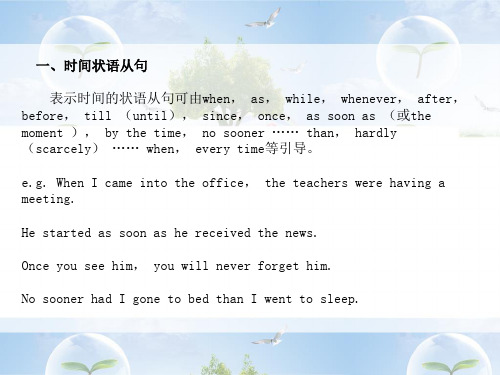
Whatever ( = No matter what ) you say, I'll never change my mind.
八、方式状语从句
方式状语从句常由as, as if (though), the way, rather than 等引导。
You can go swimming on condition that ( = if ) you don't go too far away from the river bank.
If he had come a few minutes earlier, he could have seen her.
e.g. He is disappointed because he didn't get the position.
As it is raining, I will not go out.
Now that you mention it, I do remember.
三、地点状语从句
引导地点状语从句的连词是where 和wherever等。 e.g. Sit wherever you like. Make a mark where you have a question.
一、时间状语从句
表示时间的状语从句可由when, as, while, whenever, after, before, till (until), since, once, as soon as (或the moment ), by the time, no sooner …… than, hardly (scarcely) …… when, every time等引导。
英语语法:状语从句归纳整理
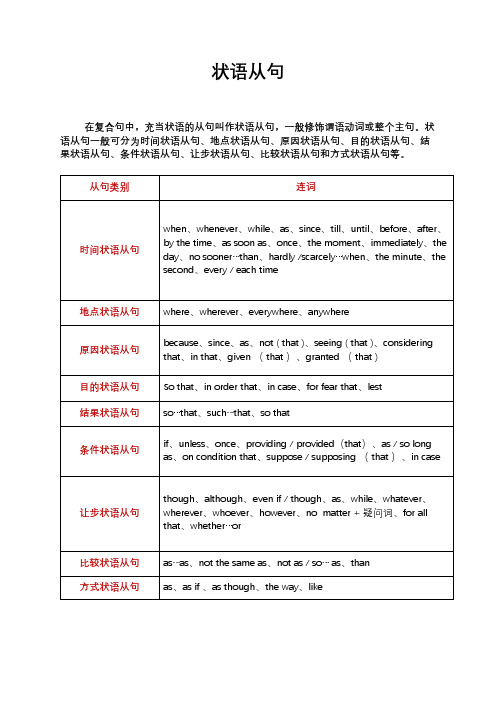
状语从句在复合句中,充当状语的从句叫作状语从句,一般修饰谓语动词或整个主句。
状语从句一般可分为时间状语从句、地点状语从句、原因状语从句、目的状语从句、结果状语从句、条件状语从句、让步状语从句、比较状语从句和方式状语从句等。
一、时间状语从句在复合句中起时间状语作用的从句称为时间状语从句,可放在句首、句中或句尾。
(二)until 和 till的用法1.肯定句:主句的谓语动词必须是延续性动词,主句、从句都为肯定式,意为“直到……为止”;2.否定句:主句的谓语动词必须是非延续性动词,从句为肯定式,表示“某动作直到某时才开始”;3.till 不可以置于句首,而until可以。
例:They waited till / until I returned.他们一直在等我回来。
You may stay here until / till the rain stops.你可以待在这里直到雨停。
He won’t go to bed until / till she returns.直到她回来,他才上床睡觉。
Until you told me I had no idea of it.直到你告诉我,我才知道这件事。
(三)since的用法(四)before的用法一般情况下before表示“在……之前”,有时根据上下文,还可表示“还未……就……” “不到……就……” “……才……” “趁……还未……”等例:Please write it down before you forget it.趁你还没忘,请把它记下来。
I must finish this letter before I go home.我必须在回家之前完成这封信。
Before I could get in a word, he had measured me.我还没来得及插话,他就给我量好了尺寸。
We had sailed four days and four nights before we saw land.我们航行了四天四夜才看到陆地。
高中英语语法知识点状语从句

• as, (just) as…so…引导的方式状语从句通常位于主句后,但在(just)as…so…结构中 位于句首,这时as从句带有比喻的含义,意思是"正如…","就像",多用于正式文体。例如:
• Always do to the others as you would be done by.你希望人家怎样待你,你就要怎样待人。 • As water is to fish, so air is to man. 我们离不开空气,犹如鱼儿离不开水。
• Just as we sweep our rooms, so we should sweep backward ideas from our minds. • 正如打扫房屋一样,我们也要扫除我们头脑中落后的东西。
• as if, as though
• 两者的意义和用法相同,引出的状语从句谓语多用虚拟语气,表示与事实相反,有时也用 陈述语气,表示所说情况是事实或实现的可能性较大。汉译常作"仿佛……似的","好 像……似的"。例如:
条件状语从句
• 连接词主要有 if, unless, as/so long as, on condition that 等。if 引导的条件句有真实条件句 和非真实条件句两种。非真实条件句已在虚拟语气中阐述。
• unless = if not. 例如: • Let's go out for a walk unless you are too tired. 如果不太累,我们去散散步。 • If you are not too tied, let's go out for a walk.
高考英语状语从句知识点知识点复习

高考英语状语从句知识点知识点复习高考英语状语从句知识点复习状语从句是高考英语中的重要语法知识点之一,掌握好状语从句对于理解和运用英语语言有着至关重要的作用。
在这篇文章中,我们将对高考英语中常见的状语从句类型进行详细的复习。
一、时间状语从句时间状语从句表示时间关系,常用的引导词有 when(当时候)、while(在期间)、as(当时,一边一边)、before(在之前)、after (在之后)、since(自从)、until / till(直到)等。
When 引导的时间状语从句,表示一个动作发生时,另一个动作正在进行或刚刚完成。
例如:“I was doing my homework when my mother came back” (当我妈妈回来的时候,我正在做作业。
)While 引导的时间状语从句,强调主句动作和从句动作在同一时期内同时发生,且持续时间较长。
例如:“While I was reading, my sister was playing the piano” (我在读书的时候,我妹妹在弹钢琴。
)As 引导的时间状语从句,强调两个动作同时发生,或一个动作随着另一个动作的变化而变化。
例如:“As time goes by, we are growing older” (随着时间的流逝,我们渐渐变老了。
)Before 和 after 引导的时间状语从句,分别表示“在之前”和“在之后”。
例如:“Please turn off the light before you leave the room” (在你离开房间之前,请关灯。
)“I will call you after I finish my work” (我完成工作之后会给你打电话。
)Since 引导的时间状语从句,表示“自从以来”,主句通常用现在完成时,从句用一般过去时。
例如:“I have lived here since I was born”(自从我出生以来,我就住在这里。
高中英语语法专题系列:状语从句

2)while
while侧重主句的动作发生在从句的时间之间,且从句的动 词必须是持续性的。 while+持续性动词 While we were chatting ,she was looking at the time table on the wall. While I slept, a thief broke in.
3)as
as表示 一边…一边…,强调从句和主句中两个动作交 替进行或同步进行。 Sometimes I watch TV as I am having breakfast.(一边...一边...) as表示随着,此用法不用when或while替 As spring warms the earth, all flowers begin to bloom. (随着)
状语从句定义
在复合句中担任状语成分的从句称为状语 从句,修饰主句的谓语动词,形容词或副 词等。
1. 时间状语从句
2. 地点状语从句 3. 原因状语从句
状语从句分类
4. 条件状语从句
5. 让步状语从句 6. 目的状语从句 7. 结果状语从句 8. 方式状语从句 9. 比较状语从句
1. 时间状语从句
经典例题
1. I was so familiar with him that I recognized his voice ______ I picked up the phone. A.while B. after C. In case D. the minute 答案:D 2. How long do you think it will take _______ our product becomes popular with the consumers? A.when B. until C. before D. since 答案:C
高考英语语法——_状语从句习题及讲解
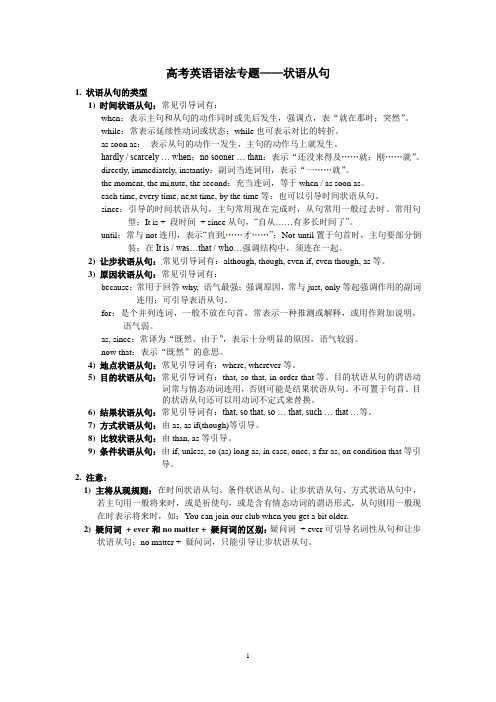
高考英语语法专题——状语从句1. 状语从句的类型1) 时间状语从句:常见引导词有:when:表示主句和从句的动作同时或先后发生,强调点,表“就在那时;突然”。
while:常表示延续性动词或状态;while也可表示对比的转折。
as soon as:表示从句的动作一发生,主句的动作马上就发生。
hardly / scarcely … when;no sooner … than:表示“还没来得及……就;刚……就”。
directly, immediately, instantly:副词当连词用,表示“一……就”。
the moment, the minute, the second:充当连词,等于when / as soon as。
each time, every time, next time, by the time等:也可以引导时间状语从句。
since:引导的时间状语从句,主句常用现在完成时,从句常用一般过去时。
常用句型:It is + 段时间+ since从句,“自从……有多长时间了”。
until:常与not连用,表示“直到……才……”;Not until置于句首时,主句要部分倒装;在It is / was…that / who…强调结构中,须连在一起。
2) 让步状语从句:常见引导词有:although, though, even if, even though, as等。
3) 原因状语从句:常见引导词有:because:常用于回答why, 语气最强;强调原因,常与just, only等起强调作用的副词连用;可引导表语从句。
for:是个并列连词,一般不放在句首,常表示一种推测或解释,或用作附加说明,语气弱。
as, since:常译为“既然、由于”,表示十分明显的原因,语气较弱。
now that:表示“既然”的意思。
4) 地点状语从句:常见引导词有:where, wherever等。
5) 目的状语从句:常见引导词有:that, so that, in order that等。
高中英语语法:状语从句知识点
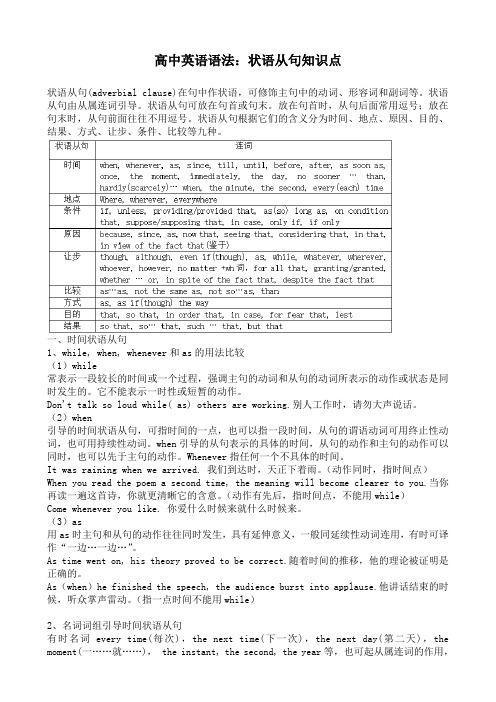
高中英语语法:状语从句知识点状语从句(adverbial clause)在句中作状语,可修饰主句中的动词、形容词和副词等。
状语从句由从属连词引导。
状语从句可放在句首或句末。
放在句首时,从句后面常用逗号;放在句末时,从句前面往往不用逗号。
状语从句根据它们的含义分为时间、地点、原因、目的、结果、方式、让步、条件、比较等九种。
一、时间状语从句1、while, when, whenever和as的用法比较(1)while常表示一段较长的时间或一个过程,强调主句的动词和从句的动词所表示的动作或状态是同时发生的。
它不能表示一时性或短暂的动作。
Don't talk so loud while( as) others are working.别人工作时,请勿大声说话。
(2)when引导的时间状语从句,可指时间的一点,也可以指一段时间,从句的谓语动词可用终止性动词,也可用持续性动词。
when引导的从句表示的具体的时间,从句的动作和主句的动作可以同时,也可以先于主句的动作。
Whenever指任何一个不具体的时间。
It was raining when we arrived. 我们到达时,天正下着雨。
(动作同时,指时间点)When you read the poem a second time, the meaning will become clearer to you.当你再读一遍这首诗,你就更清晰它的含意。
(动作有先后,指时间点,不能用while)Come whenever you like. 你爱什么时候来就什么时候来。
(3)as用as时主句和从句的动作往往同时发生,具有延伸意义,一般同延续性动词连用,有时可译作“一边…一边…”。
As time went on, his theory proved to be correct.随着时间的推移,他的理论被证明是正确的。
As(when)he finished the speech, the audience burst into applause.他讲话结束的时候,听众掌声雷动。
(完整版)高考英语语法知识点总结
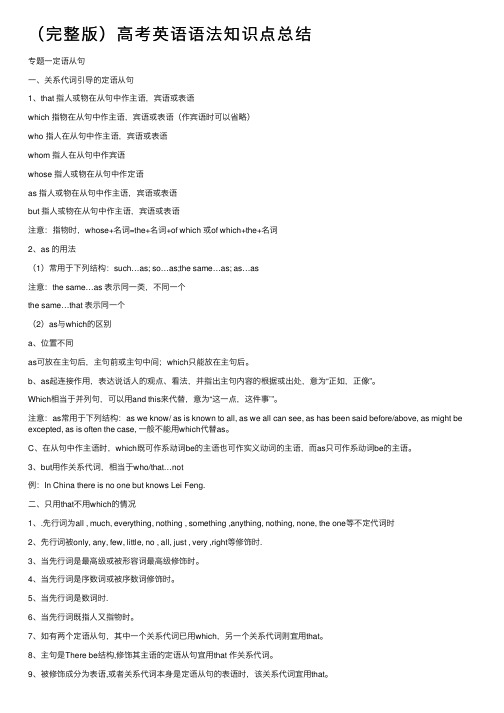
(完整版)⾼考英语语法知识点总结专题⼀定语从句⼀、关系代词引导的定语从句1、that 指⼈或物在从句中作主语,宾语或表语which 指物在从句中作主语,宾语或表语(作宾语时可以省略)who 指⼈在从句中作主语,宾语或表语whom 指⼈在从句中作宾语whose 指⼈或物在从句中作定语as 指⼈或物在从句中作主语,宾语或表语but 指⼈或物在从句中作主语,宾语或表语注意:指物时,whose+名词=the+名词+of which 或of which+the+名词2、as 的⽤法(1)常⽤于下列结构:such…as; so…as;the same…as; as…as注意:the same…as 表⽰同⼀类,不同⼀个the same…that 表⽰同⼀个(2)as与which的区别a、位置不同as可放在主句后,主句前或主句中间;which只能放在主句后。
b、as起连接作⽤,表达说话⼈的观点、看法,并指出主句内容的根据或出处,意为“正如,正像”。
Which相当于并列句,可以⽤and this来代替,意为“这⼀点,这件事’”。
注意:as常⽤于下列结构:as we know/ as is known to all, as we all can see, as has been said before/above, as might be excepted, as is often the case, ⼀般不能⽤which代替as。
C、在从句中作主语时,which既可作系动词be的主语也可作实义动词的主语,⽽as只可作系动词be的主语。
3、but⽤作关系代词,相当于who/that…not例:In China there is no one but knows Lei Feng.⼆、只⽤that不⽤which的情况1、.先⾏词为all , much, everything, nothing , something ,anything, nothing, none, the one等不定代词时2、先⾏词被only, any, few, little, no , all, just , very ,right等修饰时.3、当先⾏词是最⾼级或被形容词最⾼级修饰时。
高中英语语法--状语从句

高中英语语法状语从句一、基本概念状语(副词性)副词 动词/句子(形容词/其它副词)介词短语、动词不定式、分词短语、形容词、状语从句分类时间、地点、原因、目的、结果、条件、让步、比较、方式二、分论(一)时间状语从句(1) when 引导的时间状语从句①when 引导的时间状语从句,其动词既可以是延续性动作的动词,也可以是瞬间性动作的动词,而且可以表示主句的动作和从句的动作同时发生,或者从句的动作发生在主句的动作之前。
when you apply for a job, you must present your credentials.当你申请工作时,你必须递交你的有关证件。
(同时)when the students heard the teacher’s footsteps, they all atopped talking.当学生们听到老师的脚步声时,他们都停止了讲话。
(从句动作发生在前) ② when 还可表示just then (正在那时,突然)的意思,此时其所引导的从句只放在主句之后。
be about to do …when … 正要去做某事,突然……be doing …when…正在做某事,突然……be on the point of doing …when…正在做某事,突然……We were about to start when it began to rain.我们正要动身,突然天下起雨来。
The game had hardly/scarcely/barely begun when it started raining.比赛刚刚开始就下起雨来。
(2) as引导的时间状语从句as引导的时间状语从句其动词的动作是延续性的,而且侧重表示主句和从句的动作交替或同时发生,译为“一边……,一边……”或“随着……”We were having breakfast as she was combing her hair.她梳头时我们在吃早饭。
高考英语语法知识点归纳总结:状语从句
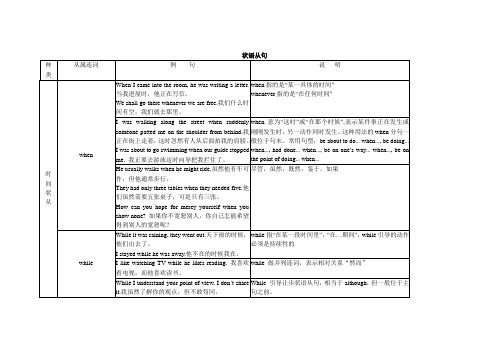
只要有生命,就有希望。
While引导条件状语从句,相当于as/so long as,翻译成“只要”
as
He hurried home, looking behind as he went.
他赶快回家,不时地一边走一边向后看。
as引导持续性动作,强调主句和从句的动作同时发生
AsIget older,Iget more optimistic.
C.“还没有……”“免得”“不知不觉”“宁可、宁愿”“否则,要不然”
It will be five years before he returns to his homeland.再过五年他才能回国。
It won’t be long before we meet again.过不了多久我们就会再见面的。
si放句首
for
He must be ill, for he is absent today.他一定是病了,因为他今天没有来。
不是说明直接原因,而是对某种情况加以推断,用于表示补充说明理由。
as
As he didn’t know much English, he looked up the word in the dictionary.
2020届高三高考英语复习语法讲解及练习题:状语从句【含答案】
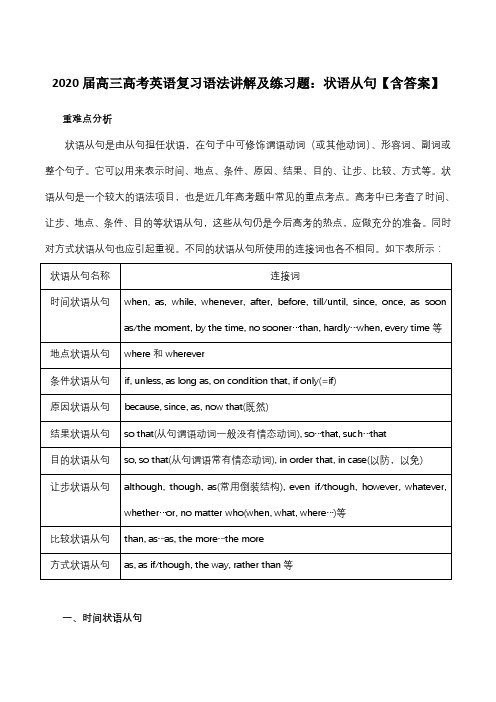
2020届高三高考英语复习语法讲解及练习题:状语从句【含答案】重难点分析状语从句是由从句担任状语,在句子中可修饰谓语动词(或其他动词)、形容词、副词或整个句子。
它可以用来表示时间、地点、条件、原因、结果、目的、让步、比较、方式等。
状语从句是一个较大的语法项目,也是近几年高考题中常见的重点考点。
高考中已考查了时间、让步、地点、条件、目的等状语从句,这些从句仍是今后高考的热点,应做充分的准备。
同时对方式状语从句也应引起重视。
不同的状语从句所使用的连接词也各不相同。
如下表所示:状语从句名称连接词时间状语从句when, as, while, whenever, after, before, till/until, since, once, as soon as/the moment, by the time, no sooner…than, hardly…when, every time等地点状语从句where和wherever条件状语从句if, unless, as long as, on condition that, if only(=if)原因状语从句because, since, as, now that(既然)结果状语从句so that(从句谓语动词一般没有情态动词), so…that, such…that目的状语从句so, so that(从句谓语常有情态动词), in order that, in case(以防,以免)让步状语从句although, though, as(常用倒装结构), even if/though, however, whatever, whether…or, no matter who(when, what, where…)等比较状语从句than, as…as, the more…the more方式状语从句as, as if/though, the way, rather than等一、时间状语从句1. while, when, as引导时间状语从句时的区别(1) while引导的状语从句中谓语动词必须是持续性动词。
英语语法精讲:状语从句--条件,方式,地点,原因等详细+经典习题(含答案)
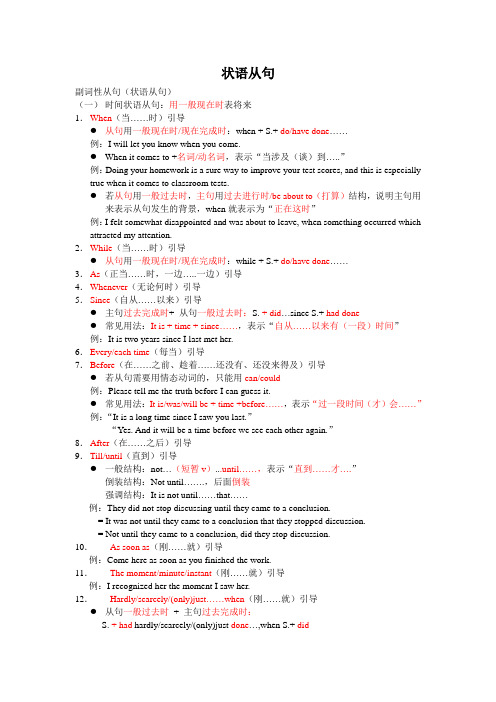
状语从句副词性从句(状语从句)(一)时间状语从句:用一般现在时表将来1.When(当……时)引导●从句用一般现在时/现在完成时:when + S.+ do/have done……例:I will let you know when you come.●When it comes to +名词/动名词,表示“当涉及(谈)到…..”例:Doing your homework is a sure way to improve your test scores, and this is especially true when it comes to classroom tests.●若从句用一般过去时,主句用过去进行时/be about to(打算)结构,说明主句用来表示从句发生的背景,when就表示为“正在这时”例:I felt somewhat disappointed and was about to leave, when something occurred which attracted my attention.2.While(当……时)引导●从句用一般现在时/现在完成时:while + S.+ do/have done……3.As(正当……时,一边…..一边)引导4.Whenever(无论何时)引导5.Since(自从……以来)引导●主句过去完成时+ 从句一般过去时:S. + did…since S.+ had done●常见用法:It is + time + since……,表示“自从……以来有(一段)时间”例:It is two years since I last met her.6.Every/each time(每当)引导7.Before(在……之前、趁着……还没有、还没来得及)引导●若从句需要用情态动词的,只能用can/could例:Please tell me the truth before I can guess it.●常见用法:It is/was/will be + time +before……,表示“过一段时间(才)会……”例:“It is a long time since I saw you last.”“Yes. And it will be a time before we see each other again.”8.After(在……之后)引导9.Till/until(直到)引导●一般结构:not…(短暂v)...until……,表示“直到……才….”倒装结构:Not until…….,后面倒装强调结构:It is not until……that……例:They did not stop discussing until they came to a conclusion.= It was not until they came to a conclusion that they stopped discussion.= Not until they came to a conclusion, did they stop discussion.10.As soon as(刚……就)引导例:Come here as soon as you finished the work.11.The moment/minute/instant(刚……就)引导例:I recognized her the moment I saw her.12.Hardly/scarcely/(only)just……when(刚……就)引导●从句一般过去时+ 主句过去完成时:S. + had hardly/scarcely/(only)just done…,when S.+ did●若hardly/scarcely/(only)just置于句首,主句须倒装(had+ S.+ done)例:He had hardly left school when it began to rain.=Hardly had he left school when it began to rain.13.No sooner……than(刚……就)引导●从句一般过去时+ 主句过去完成时:S. + had no sooner done…, than S.+ did●若no sooner置于句首,主句须倒装(had+ S.+ done)例:We had no sooner reached the top of hill than we all sat down to rest.=No sooner had we reached the top of hill than we all sat down to rest.(二)地点状语从句1.Where(在……地方)引导:从句用一般现在时例:Where there is smoke, there is fire.2.Wherever(无论在哪里)引导例:Wherever he may be, he will be welcome.(三)条件状语从句:用一般现在时表将来1.If(如果、假如)引导:用虚拟语气●if引导得从句中,若有were, had, should三词,可以省略if,并且倒装(谓语置前)例:If I had known about it, I would have told you.= Had I known about it, I would have told you.●If从句+主句= 祈使句/省略句+ and +…….例:If you give me some food, I won’t die of starvation(饥饿).= Some food and I won’t die of starvation;2.Suppose/supposing(假设)引导例:Suppose we cannot get the necessary equipment(设备), what shall we do? 3.Unless(除非、如果不)引导●Unless从句+主句= 祈使句/省略句+ or +…….例:Unless you give me another drink, I will die of thirst.= Another drink or I will die of thirst.4.As/so long as(只要)引导例:We can surely overcome these difficulties so long as we are closely united.5.If only/only if(只要)引导例:We can surely get gains, if only we work hard.6.In case/lest(万一)例:You should take good care of your kid, in case they are ill.7.Provided/Providing/Given that(假如)引导例:We will let you use the room provided that you keep it clean and tidy.8.On condition that(假如)引导(四)原因状语从句1.Because(因为)引导●表示“直接、唯一的原因”,通常放在句后,可以与not, but, only连用例:He was angry not because we were late but because we made a noise.2.As(因为)引导●表示“显而易见或大家都知道的原因”,语气较弱例:Everyone likes you as you are both kind and honest.3.Since(因为、既然)引导●表示“间接或附带的原因”,通常放在句首例:Since she insists, you must come.4.Now/seeing that(既然)引导例:Now/Seeing that you are all here, let’s try and reach a decision.5.Considering that (考虑到)引导例:Considering that he began learning English only a year ago, he speaks very well. 6.In that(由于、因为)引导例:He was late in that he didn’t catch the first bus.(五)让步状语从句1.Though/although/as(虽然)引导●Though/although…..yet连用,表示“虽然…..但是……”例:Though/although we cannot see air, (yet) it exists everyone.●as引导得从句置于句首,且倒装(表语、状语、动词置于as前)表语倒装:可以省略冠词例:Tried as I was, I stayed up late studying last night.Children as he is, he knows a lot of English.状语倒装:Fast as he read, you can’t finish novel in three days.谓语动词倒装:Try as he would, he couldn’t lift the rock.2.Even if/though(即使)引导例:Nobody lost his patience as though the meeting was long and boring. 3.However/no matter how(无论如何/怎样)引导例:We’ll continue to work, no matter how/however hot it is.4.Whatever/no matter what(无论什么)引导例:Whatever/no matter what r you may do, do your best.5.Whoever/no matter who(无论谁)引导例:Whoever/no matter who all cannot break the rules, we must keep the law. 6.Whether……or/no matter whether…..or….(不管……还是)引导例:Whether/no matter whether you can do or cannot do, you must try it. 7.Whether or not/whether……or not(不管是否……)引导例:Whether or not we had a baby, we couldn’t survive only on my salary.= Whether we had a baby or not, we couldn’t survive only my salary.(六)方式状语从句1.As(如,按照)引导例:When in Roma do as the Romans do.2.Just as(正如)引导例:Most plants need air just as they need water.3.As if/though(好像,仿佛)引导●引导的从句常用虚拟语气,除了叙述的情况实现的可能性较大例:He speaks English as if/though he were an Englishman.例:It looks as if/though the coming autumn harvest will be even better than the last one. (七)目的状语从句1.So that(以便、为了)引导●从句中谓语部分可以用can/could,may/might例:I will give you my phone number, so that you can call me when you arrive here. 2.In order to(以便、为了)引导●从句中谓语部分只能用may/might例:We should do our utmost最大可能in order that we may be able to overfulfil 超额完成the task.3.For fear that/lest(以免、以防)引导●从句用虚拟语气“should +V.”例:Batteries 电池must be kept in dry place for fear that/lest electricity should leak 渗漏away.4.In case(以免、以防)引导●从句中谓语部分不用虚拟语气例:Better take more clothes in case the weather is cold.(八)结果状语从1.that(因而)引导例:What’s the matter that they still haven’t answered our e-mail?2.so that(因而)引导●主句,+ so that,且从句中谓语部分只能用may/might例:The temperature is increased , so that the volume of the gas can become greater. 3.So…..that(如此……以至)引导●so +形容词/副词+a/an+名词+ that例:It is so hot a day that we cannot sleep.●so置于句首时,需倒装状语例:So fast did he run that I could not keep up with him●so + much/little/few/many + that,而不用such…..that例:She has so little education that she is unable to get a job.4.Such…..that(如此……以至)引导●Such +名词(可数的单数名词)+ that例:It is such a lovely day that everybody is feeling happy and gay.(九)比较状语从句1.Than(比……)引导例:There are more vocabularies in this unit than in that one.2.As……as(如……一样)引导●As +形容词/副词+a/an+名词+ as + 省略句例:He is as clever a boy as his brother.例:This book is nearly as thick as that one(is).3.Not so……as(不如……一样)引导●As +形容词/副词+a/an+名词+ as + 省略句例:You are not as tall as she.4.The+比较级,the+比较级(越……越…….)引导例:The hotter that air becomes, the lighter it gets.例题1、()______ your daughter has not come back , let me take you to the Friendship Hospital.A WhenB SinceC ThatD For2、()______ Tom is not feeling well today , he has to stay at home.A ThoughB ForC FindingD As3、()They are ______ hard-working students that they have already made ______ much progress since thay came here.A so ; soB such ; suchC so ; suchD such ; so4、()______ we have finished the book we shall start doing some exercises.A For nowB Since nowC Now thatD Since now5、()He asked us not to be noisy ______ we should wake the baby.A in cseB in the caseC in case ofD in this case巩固练习1、()______ you are familiar with the auther`s ideas , by reading all the sections as quickly as you can.A Ever sinceB As long asC So thatD Now that2、()The boy has to learn ______ things that he hardly has time for play.A so manyB such manyC so fewD such few3、()In the old days the poor worker worked long hours every day ______ he could support his whole family.A becauseB thoughC unlessD so that4、()Tell him that I will call him back , ______ he gives me a call.A in most casesB in caseC in any caseD in case of5、()______ you have reminded me , I will try to be a teacher.A Now thenB So thatC Now thatD In order that6、()You will have to study for many years ______ you may become a brain surgeon.A in order thatB in thatC althoughD soKey 1~5 BDDCA 1~6 DADBCA二、习题1、()It is almost impossible to become skilful in speaking a language ______ you use it constantly.A but forB if onlyC exceptD unless2、()Everything will be all right ______ Tom is left to do the work in his own way.A as far asB mean whileC so long asD in case3、()Do remind me of the date again tomorrow ______ I forget.A in caseB except thatC even ifD as though4、()You must do the experiment ______ the teacher told you.A asB sinceC so thatD unless5、()I could not resist having another piece of cake even ______ I was supposed to lose weight.A althoughB howeverC otherwiseD though6、()______ I suggest , he always disagree.A WhatB HowC WhateverD How a7、()However ______ you hate them , you must work with them.A very muchB too muchC much tooD much8、()Try ______ he might , Tom could not get out of the trouble.A as ifB altoughC ifD as9、()______ whales are very large , they are no longer an even match for man.A SinceB BecauseC Now thatD Although10、()Man must have food just ______ plants must have sunlight.A forB likeC becauseD as巩固练习1、()______ I know , the visitors are all satisfied with the arrangement in the next few days.A As far asB As long asC As well asD As soon as2、()______ convincing an argument is , it needs support of evidence.A No matterB ThoughC HoweverD As3、()Anyone can borrow books from the library ______ he has a library card.A so long asB sinceC even thoughD unless4、()______ much advice I gave him , he did exactly what he wanted to do.A HowB WhateverC WhatD No matter how5、()Remember , science requires your whole life ______ you had two lives to give , they would not be enough.A AlthoughB ThoughC If onlyD Even if6、()I am sure that Laura`s latest play , ______ staged , will prove a great success.A sinceB unlessC onceD until7、()Send us a message , ______ you have any difficulty.A in case thatB in caseC whileD as8、()Electricity flows through a wire ______ water flows through a pipe.A whileB just asC much asD whenever9、()Food shortage will long be a world problem ______ much has been done to supply enough for everyone.A althoughB evenC no matterD since10、()I do not like the city , ______ though I have been living here for more than ten years.A evenB asC everD butkey1~5 DCAAD 6~10 CDDDD 1~5 ACADD 6~10 CBBAA。
高考英语语法学习之状语从句精讲讲义
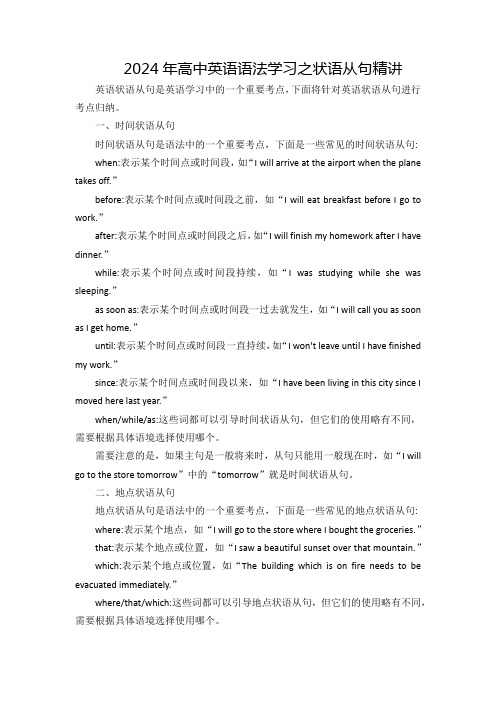
2024年高中英语语法学习之状语从句精讲英语状语从句是英语学习中的一个重要考点,下面将针对英语状语从句进行考点归纳。
一、时间状语从句时间状语从句是语法中的一个重要考点,下面是一些常见的时间状语从句: when:表示某个时间点或时间段,如“I will arrive at the airport when the plane takes off.”before:表示某个时间点或时间段之前,如“I will eat breakfast before I go to work.”after:表示某个时间点或时间段之后,如“I will finish my homework after I have dinner.”while:表示某个时间点或时间段持续,如“I was studying while she was sleeping.”as soon as:表示某个时间点或时间段一过去就发生,如“I will call you as soon as I get home.”until:表示某个时间点或时间段一直持续,如“I won't leave until I have finished my work.”since:表示某个时间点或时间段以来,如“I have been living in this city since I moved here last year.”when/while/as:这些词都可以引导时间状语从句,但它们的使用略有不同,需要根据具体语境选择使用哪个。
需要注意的是,如果主句是一般将来时,从句只能用一般现在时,如“I will go to the store tomorrow”中的“tomorrow”就是时间状语从句。
二、地点状语从句地点状语从句是语法中的一个重要考点,下面是一些常见的地点状语从句: where:表示某个地点,如“I will go to the store where I bought the groceries.”that:表示某个地点或位置,如“I saw a beautiful sunset over that mountain.”which:表示某个地点或位置,如“The building which is on fire needs to be evacuated immediately.”where/that/which:这些词都可以引导地点状语从句,但它们的使用略有不同,需要根据具体语境选择使用哪个。
高考英语状语从句语法讲解

高考英语状语从句语法知识点梳理(名师总结基础语法知识点,值得下载)结构图概述时间状语从句的用法:1、2、3、4、5、6、7状语从句 地点状语从句的用法:原因状语从句的用法:1、2、3、4 条件状语从句的用法:1、2用法 方式状语从句的用法:让步状语从句的用法:1、2、3目的状语从句的用法:结果状语从句的用法:1、2、3 比较状语从句的用法:1、2、3、4、5、6一、概述:状语从句修饰主句中的动词、形容词、副词等,在复合句中作状语。
引导状语从句的关联词是从属连词。
状语从句用陈述句语序,一般位于复合句的句首或句末。
当从句放在主句前面时,常用逗号与主句隔开。
状语从句根据其在句中的不同作用可以分为时间、地点、原因、目的、结果、条件、让步、方式和比较状语从句九种。
二、用法:(一)时间状语从句的用法:1、注意点:⑴在时间、条件状语从句中,谓语动词一般不用将来时态表示将来,而用一般现在时态代替将来时态,用一般过去时态代替过去将来时态,用现在完成时态代替将来完成时态。
如:When he comes here,I will let you know. When I have finished reading the book,I will tell you.⑵if可以引导条件状语从句和宾语从句,引导条件状语从句时,意为“如果,假如”,引导宾语从句时,意为“是否”。
如:If he has any questions,he will come to ask me. Tell me if you will go to school tomorrow.⑶时间、条件、方式、让步等状语从句常常可以转换成省略形式或简单句句子成分。
①when,while,as,if,though,as if等引导时间、条件、方式、让步等状语从句时,若从句和主句的主语一致或主句的主语是it且含有be动词时,可以将从句中的主语连同后面的be动词一起省略。
高考英语状语从句的用法归纳
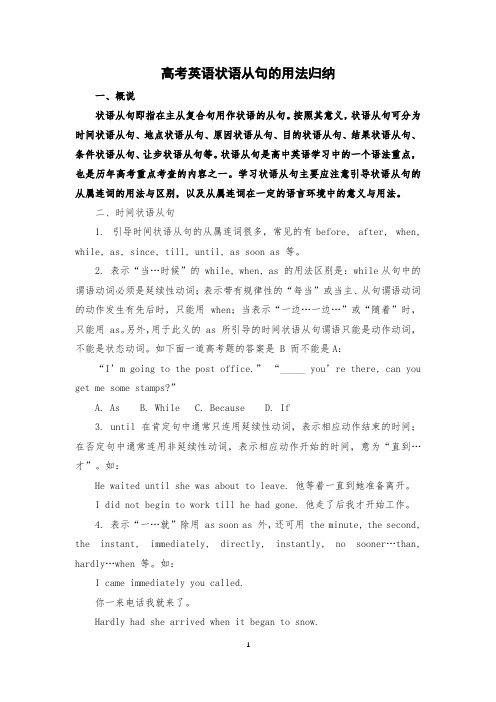
高考英语状语从句的用法归纳一、概说状语从句即指在主从复合句用作状语的从句。
按照其意义,状语从句可分为时间状语从句、地点状语从句、原因状语从句、目的状语从句、结果状语从句、条件状语从句、让步状语从句等。
状语从句是高中英语学习中的一个语法重点,也是历年高考重点考查的内容之一。
学习状语从句主要应注意引导状语从句的从属连词的用法与区别,以及从属连词在一定的语言环境中的意义与用法。
二、时间状语从句1. 引导时间状语从句的从属连词很多,常见的有before, after, when, while, as, since, till, until, as soon as 等。
2. 表示“当…时候”的 while, when, as 的用法区别是:while从句中的谓语动词必须是延续性动词;表示带有规律性的“每当”或当主、从句谓语动词的动作发生有先后时,只能用 when;当表示“一边…一边…”或“随着”时,只能用 as。
另外,用于此义的 as 所引导的时间状语从句谓语只能是动作动词,不能是状态动词。
如下面一道高考题的答案是 B 而不能是A:“I’m going to the post office.” “_____ you’re there, can you get me some stamps?”A. AsB. WhileC. BecauseD. If3. until 在肯定句中通常只连用延续性动词,表示相应动作结束的时间;在否定句中通常连用非延续性动词,表示相应动作开始的时间,意为“直到…才”。
如:He waited until she was about to leave. 他等着一直到她准备离开。
I did not begin to work till he had gone. 他走了后我才开始工作。
4. 表示“一…就”除用 as soon as 外,还可用 the minute, the second, the instant, immediately, directly, instantly, no sooner…than, hardly…when 等。
英语语法---状语从句
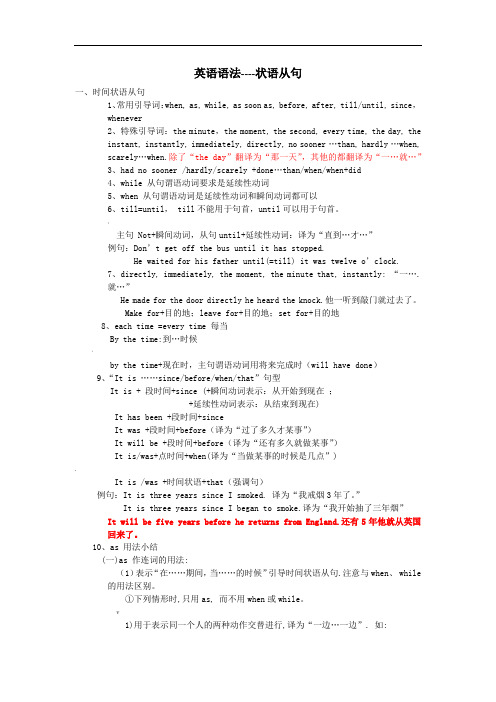
英语语法----状语从句一、时间状语从句1、常用引导词:when, as, while, as soon as, before, after, till/until, since,whenever2、特殊引导词:the minute,the moment, the second, every time, the day, theinstant, instantly, immediately, directly, no sooner …than, hardly …when, scarely…when.除了“the day”翻译为“那一天”,其他的都翻译为“一…就…”3、had no sooner /hardly/scarely +done…than/when/when+did4、while 从句谓语动词要求是延续性动词5、when 从句谓语动词是延续性动词和瞬间动词都可以6、till=until, till不能用于句首,until可以用于句首。
:主句 Not+瞬间动词,从句until+延续性动词:译为“直到…才…”例句:Don’t get off the bus until it has stopped.He waited for his father until(=till) it was twelve o’clock.7、directly, immediately, the moment, the minute that, instantly: “一….就…”He made for the door directly he heard the knock.他一听到敲门就过去了。
Make for+目的地;leave for+目的地;set for+目的地8、each time =every time 每当By the time:到…时候`by the time+现在时,主句谓语动词用将来完成时(will have done)9、“It is ……since/before/when/that”句型It is + 段时间+since (+瞬间动词表示:从开始到现在;+延续性动词表示:从结束到现在)It has been +段时间+sinceIt was +段时间+before(译为“过了多久才某事”)It will be +段时间+before(译为“还有多久就做某事”)It is/was+点时间+when(译为“当做某事的时候是几点”).It is /was +时间状语+that(强调句)例句:It is three years since I smoked. 译为“我戒烟3年了。
高考英语状语从句语法知识点精讲(推荐)

高考英语状语从句语法知识点梳理(名师总结基础语法知识点,值得下载)在复合句中修饰主句或主句中的某一成分的从句叫状语从句。
状语从句通常由从属连词或起连词作用的词组引导,有时甚至不需要连词直接和主句连接起来。
状语从句根据它表达的意思不同,可分为时间、地点、原因、目的、结果、条件、方式、比较、让步等九类。
一、时间状语从句时间状语从句是表示时间关系的从句。
可以引导时间状语从句的连词很多,根据意义和主从句之间的时间关系,通常可分为以下几种情况:A.when, while, as, wheneverwhen, while, as表示主句谓语作和从句的谓语动作同时发生或几乎同时发生。
1.when①when表示点时间时,从句中用短暂性动词;表示段时间时,用持续性动词。
When I got home, my family were already having dinner.我到家的时候,全家已在吃晚饭。
(when表示点时间)When they were still talking and laughing, the teacher came in.当他们还在说笑的时候,老师进来了。
(when表示段时间)He waved a hello when he saw her.当他看见她的时候,就挥手打了个招呼。
(when表示点时间)When you think you know nothing, you begin to know something.当你认为自己一无所知的时候,就开始知道一些事情了。
(when表示段时间)注意:当when意思是正当……时候(and at that moment)时,when只能跟在前一分句之后。
He was about to go to bed when the doorbel rang.他正要上床,忽然门铃响了。
They were watching the World Cup when suddenly the lights went out.他们正看着世界杯比赛,突然灯灭了。
高三英语知识点重点语法总结

高三英语知识点重点语法总结高三英语语法知识点1地点状语从句1地点状语从句由where,wherever引导。
注意:where与where的区别:Where表特定的地点,而wherever表示非特定的地点。
Wherever=to/at any place where2地点状语从句与定语从句的区别Where引导定语从句时,从句前应有一个表示地点的名词作先行词;而状语从句前则无先行词。
原因状语从句引导词:because, since,as, now th at, not that…, but that…, seeing that,considering that, in that注意:for也可以表示原因,属并列连词,但不是说明直接原因,而是对某种情况加以推断,用于表示补充说明理由。
目的状语从句引导词:so, so that, in order that, that, to the end that(以便,为了),in case,forfear that,lest(以免,以防),目的状语从句中通常有情态动词can,could,may,might,should,would等。
注意:1in case 还可表示“万一,假如”。
2目的状语从句可以用so as to, in order to 等不定式代替,但主句和从句的主语必须一致。
高三英语语法知识点2英语中过去分词可作宾补,(此时的过去分词一般是及物动词)表被动意义或完成意义,有时两者兼而有之。
做宾补的过去分词与宾语有逻辑上的动宾关系,即宾语是过去分词动作的对象。
如:She found the door broken in when she came back.(宾补与宾语有被动的关系,表一种状态。
)一. 过去分词用在表状态的动词keep,leave等的后面。
Eg:They kept the door locked for a long time.Keep your mouth shut and your eyes open.(谚语:少说多看)Don t leave such an important thing undone.Don t leave the windows broken like this all the time.二.过分词用在get,have,make, 的后面。
高考英语 考点一遍过 考点30 地点状语从句(含解析)

考点30 地点状语从句高考频度:★★☆☆☆一、where引导的地点状语从句1.从属连词where表示"在(或到)……的地方"。
Where there is a will, there is a way. 有志者事竟成。
Put it where you found it. 把它放在原来的地方。
2. where 在地点状语从句中,除指地点外,还可指处境等。
He said he was happy where he was. 他说他对自己的处境很满意。
It’s your fault that she is where she is. 她今天落到这个地步都怪你。
3. 有时地点状语从句中的某些词可以省略。
Fill in the blanks with the given phrases. Change the form where necessary. 用所给的短语填空,必要的地方可以改变其形式。
Avoid structure of this kind where possible. 只要可能,就要避免这种结构。
4. Half an hour later, Lucy still couldn’t get a taxi _______ the bus had dropped her.A. untilB. whenC. althoughD. where【答案】D【名师点睛】本题考查定语从句。
定语从句是高考重点考查知识之一,分析定语从句需要牢牢抓住两点:第一、找准先行词。
第二、看先行词在从句中所作的成分。
抓住这两点,再根据句意,从而能够判断出正确的关系词。
2.______ he once felt like giving up, he now has the determination to push further and keep on going.A. WhereB. AsC. In caseD. Now that【答案】A【解析】句意:曾经让他感到想放弃的地方,现在他决心继续前进。
- 1、下载文档前请自行甄别文档内容的完整性,平台不提供额外的编辑、内容补充、找答案等附加服务。
- 2、"仅部分预览"的文档,不可在线预览部分如存在完整性等问题,可反馈申请退款(可完整预览的文档不适用该条件!)。
- 3、如文档侵犯您的权益,请联系客服反馈,我们会尽快为您处理(人工客服工作时间:9:00-18:30)。
考点30 地点状语从句高考频度:★★★★★一、where引导的地点状语从句1.从属连词where表示"在(或到)……的地方"。
Where there is a will, there is a way. 有志者事竟成。
Put it where you found it. 把它放在原来的地方。
2. where 在地点状语从句中,除指地点外,还可指处境等。
He said he was happy where he was. 他说他对自己的处境很满意。
It’s your fault that she is where she is. 她今天落到这个地步都怪你。
3. 有时地点状语从句中的某些词可以省略。
Fill in the blanks with the given phrases. Change the form where necessary. 用所给的短语填空,必要的地方可以改变其形式。
Avoid structure of this kind where possible. 只要可能,就要避免这种结构。
4. Half an hour later, Lucy still couldn’t get a taxi _______ the bus had dropped her.A. untilB. whenC. althoughD. where【答案】D【名师点睛】本题考查定语从句。
定语从句是高考重点考查知识之一,分析定语从句需要牢牢抓住两点:第一、找准先行词。
第二、看先行词在从句中所作的成分。
抓住这两点,再根据句意,从而能够判断出正确的关系词。
2.______ he once felt like giving up, he now has the determination to push further and keep on going.A. WhereB. AsC. In caseD. Now that【答案】A【解析】句意:曾经让他感到想放弃的地方,现在他决心继续前进。
A那里;B尽管,当,因为,随着;C以防;D既然。
where表示地点,引导让步状语从句;as引导让步状语从句常用倒装,即tried as he has;in case表目的;now that表原因。
这里指让他感到想放弃的地方,故选A。
二、wherever引导的地点状语从句从属连词wherever意为"在(或到)……的各个地方"。
You can go wherever(anywhere) you like these days. 这些天你可以去你想去的地方。
Where (Everywhere) they went, the experts were warmly welcomed. 专家们每到一处,都受到热烈的欢迎。
In the global economy, a new drug for cancer, ________ it is discovered, will create many economic possibilities around the world.A.whateverB. whoeverC. whereverD.whichever【答案】C【巧学妙记】题组一能力过关单项填空1. ______________ there is supply and demand, there is commerce.A. WhenB. WhereC. Even ifD. As if2. You probably can’t get much sleep if you live near _____________ a wedding reception _____________.A. the place;is being heldB. the place where;has been heldC. where;is being heldD. which;has been held3. Everything was placed exactly ______________ he wanted it for the graduation ceremony.A. whichB. whatC. whereD. when4. He told us that he used to live ______________ there were many mountains with trees and animals on them.A. whenB. whatC. in whichD. where5. Do you believe ______________ true ______________ you find high wages, you generally find high prices?A. that;thatB. that;that whatC. it;whenD. it;that where6. I usually write down something unforgettable on a piece of paper that I bring _____________ I go without my computer.A. whoeverB. whereverC. whateverD. however7. Remember you are a Chinese ______________ you go.A. whereB. howC. howeverD. wherever8. After you have used the dictionary, please put it back _____________ it belongs.A. whereB. to whichC. whatD. that 题组二体验真题1.(2017·江苏卷)Located ________ the Belt meets the Road, Jiangsu will contribute more to the Belt and Road construction.A. whyB. whenC. whichD. where2.(2015·天津卷)The boss of the company is trying to create an easy atmosphere ______________ his employees enjoy their work.A. whereB. whichC. whenD. who3.(2015·江苏卷)_____ Li Bai, a great Chinese poet, was born is known to the public, but some won’t accept it.A. ThatB. WhyC. WhereD. How题组一能力过关单项填空1. B 【解析】考查地点状语从句。
句意:哪里有供需,哪里就有商业。
此处为Where 引导的地点状语从句,相当于in the place where,全句相当于there is commerce in the place where there is supply and demand,故B项正确。
3. C 【解析】考查地点状语从句。
句意:一切东西都已准确地放在了他想要举行毕业典礼的地方。
由where引导地点状语从句,相当于at the place where。
which哪个;what什么;where哪里;when当……的时候,根据句意,故选C。
4. D 【解析】考查状语从句。
句意:他告诉我们他过去常住在一个群山环抱、树木葱葱、鸟兽成群的地方。
根据句意可知,live是不及物动词,其后接的是地点状语从句,故选D。
zx.xk5. D 【解析】句意:你相信在找到高薪工作的地方物价一般也比较高的这个说法吗?第一个空填it,it作形式宾语;第二个空要填that,that引导的宾语从句是句子真正的宾语,在宾语从句中又含有一个where引导的地点状语从句。
故选D。
6. B 【解析】句意:无论我到哪儿,(如果)没有(带)我的电脑我通常会把一些令人难忘的东西写在我带的一张纸上。
根据句意并分析句子结构可知,从句缺少地点状语,故用wherever。
7. D 【解析】考查状语从句。
句意:不论你到哪里,记住你是个中国人。
分析句子结构且结合句意可知,此处应用wherever引导地点状语从句。
8. A 【解析】考查地点状语从句。
where 引导的是一个地点状语从句,相当于(比如说一个介词短语作地点状语)put it back on the shelf。
不要把它理解成定语从句,因为并没有定语从句所修饰的先行词。
如果改成"please put it back on the shelf to which it belongs",就可以用B了。
故选A。
题组二体验真题3.C 【解析】句意:李白是中国一位伟大的诗人,他的出生地是众所周知的,但有些人不愿接受这一事实。
分析句子结构可知,a great Chinese poet做Li Bai的同位语,is前面是主语从句。
比较选项只有where符合句意,where在从句中做地点状语。
故选C 项。
